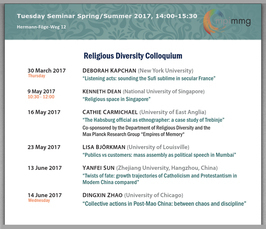"Publics vs customers: mass assembly as political speech in Mumbai"
Religious Diversity Colloquium Spring/Summer 2017
- Date: May 23, 2017
- Time: 02:00 PM - 03:30 PM (Local Time Germany)
- Speaker: Lisa Björkman (University of Louisville)
- Lisa Björkman is Assistant Professor of Urban and Public Affairs at the University of Louisville. Her work studies how global processes of urbanism and urban transformation are redrawing lines of socio-spatial exclusions and inclusions in Mumbai, animating new arenas of political mobilization, contestation and representation. Lisa’s book „Pipe Politics, Contested Waters: Embedded Infrastructures of Millennial Mumbai“ (Duke University Press, 2015), is a political ethnography about the encounter in Mumbai between market-oriented urban development reforms and the material politics of the city’s water infrastructures. Pipe Politics was awarded the American Institute of Indian Studies’ 2014 Book Prize in the Indian Social Sciences. Lisa received a Ph.D. in Politics from the New School for Social Research in New York in 2012.
- Location: MPI-MMG, Hermann-Föge-Weg 12, Göttingen
- Room: Conference Room

For more details please contact vdvoffice(at)mmg.mpg.de.
This talk explores a somewhat curious use of the word “public” in the political life of Mumbai, where the word is used to describe cash-compensated crowds assembling for political gatherings - protest marches, road blocks, campaign rallies. Popular and scholarly discourse tends to dismiss paid crowds as inauthentic, even fraudulent forms of political assembly – reducible to instrumentalist and transactionalist logics. This paper explores a different form of political relationality that may be at work here by attending to the way the word “public” circulates in a very different context in Mumbai, where it is used to describe audiences of lavani dance when the dance is performed in the context of a theatrical stage show. When performed in any other context or venue – in a Sangeet Bari theatre for instance – the audience is described not as a public but rather as customers. The paper unpacks the meaning of public in relation to its opposite – customer – in the context of lavani audiences in order to make sense of theatrical dimensions of cash-mediated mass political assembly in Mumbai. Understanding public as the opposite of customer insists that we take theatrical forms of mass assembly quite seriously as a form of political speech and representation.